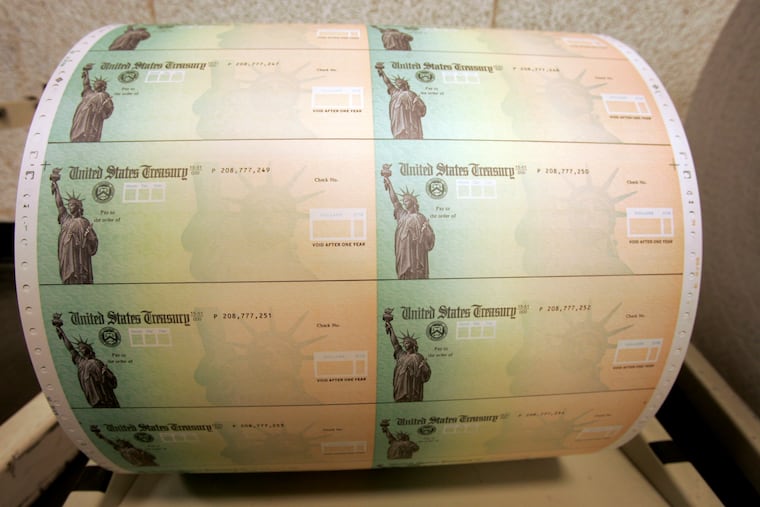How will switch to all-digital Social Security payments affect Pennsylvanians?
Can a seamless changeover from Social Security paper checks to digital banking be accomplished in six months?

While President Donald Trump has signed numerous executive orders lately that have rattled, angered, or confused people, one that was announced on Wednesday has drawn little scrutiny, but could have outsize consequences for a specific group of Americans.
The order, Modernizing Payments To and From America’s Bank Account, states that the government by Sept. 30 will no longer mail out paper checks to Social Security recipients. People instead will be compelled to use direct deposit, or prepaid cards such as Direct Express, with “limited exceptions” for those without bank accounts.
Only a fraction of Americans get their benefits via check: Of the 69 million retirees, disabled workers, their spouses, children, and survivors of deceased workers who receive $1.6 trillion in Social Security benefits, just around 500,000 still receive checks. Of that group, 19,000 live in Pennsylvania, while 11,000 are in New Jersey, according to Axios, which first reported the story.
What’s not clear is how the changeover from paper to digital payments will be accomplished in six months during the same time many Social Security workers are being let go, offices are closing down, and some services are being curtailed.
“My concern is that when you try to do too much too fast, you can mess up,” said Kathleen Romig, director of Social Security and disability policy at the Center on Budget and Policy Priorities in Washington, D.C.
The White House and local Social Security Administration officials didn’t answer requests for comment.
Can those receiving paper Social Security checks handle the technology?
“We don’t know how this will work, and we have concerns,” said Jennifer Burdick, an attorney at Community Legal Services in Philadelphia and a Social Security expert. “How would people who have opted out of banks or don’t use direct deposit be able to explain their circumstances?
“What would I as an attorney have to argue to prove people can’t use electronic banking, or meet Social Security requirements?”
Burdick said that many clients aren’t technically savvy enough to arrange for a direct deposit account. Others have cognitive disabilities that preclude them from using online banking, she added. And many elderly people just feel more comfortable with the paper checks that have been available for 90 years, Burdick said.
The elderly are accustomed to doing things in a certain way, said Allen Glicksman, a scientist in the research department at NewCourtland, a senior health care and supportive service nonprofit in Germantown.
“Going to the bank to cash a Social Security check is an opportunity to socialize with the teller and others,” Glicksman said. “They often don’t have anyone else to talk to.”
Moving away from paper checks
The thinking behind Trump’s executive order isn’t new.
“The policy to stop sending Social Security paper checks has been in place for at least 10 years,” said Kathy Cubit, advocacy manager for the Center for Advocacy for the Rights and Interests of Elders (CARIE) in Center City.
There’s been a movement toward getting people away from paper, which is how Direct Express was formulated.
A program of the U.S. Department of Treasury, Direct Express has been run by Comerica Bank. It allows federal benefit payments to be electronically deposited onto cards, which can be used to make purchases, pay bills, or withdraw cash at ATMs or banks that accept Mastercard.
There have been problems, however.
“It’s great in theory, but lots of clients have had very terrible experiences,” said Kerry Smith, an attorney in Community Legal Services’ homeownership and consumer rights unit.
“Literally, Comerica never answers the phone,” Smith said.
Last December, the Consumer Financial Protection Bureau (CFPB) sued Comerica Bank for systematically failing its 3.4 million Direct Express cardholders — unbanked people on Social Security. Nearly 150,000 are in Pennsylvania, with 87,000 in New Jersey.
CFPB has charged that the bank deliberately disconnected 24 million customer service calls, impeding cardholders from exercising their rights under the law; charged illegal ATM fees to over 1 million cardholders; and mishandled fraud complaints.
Comerica countersued, and the matter is still pending. Currently, the Trump administration has worked to dismantle the CFPB.
Michael Astrue, who was appointed to run the Social Security Administration by President George Bush in 2006, said in an interview Friday with The Inquirer that even he tried to “push people to use direct deposit.”
But, he added, he disagrees with the Trump administration’s methods.
“To simply pull the right to have a check mailed to you is unconscionable,” Astrue said. “The assumption that everyone has the ability to get a bank account is just wrong.”